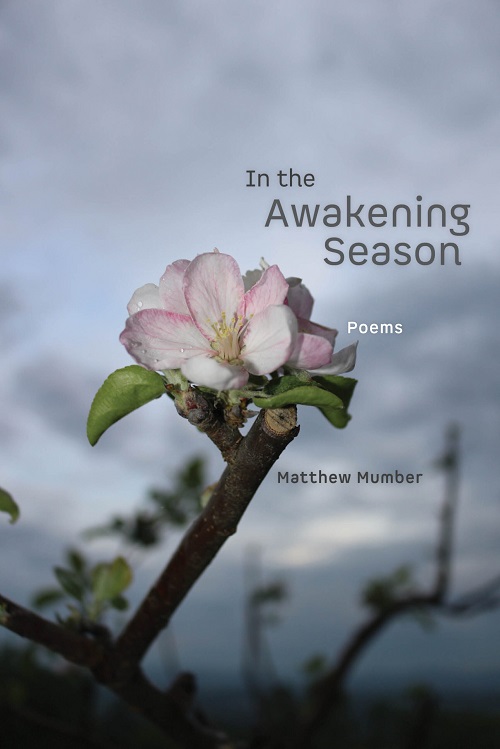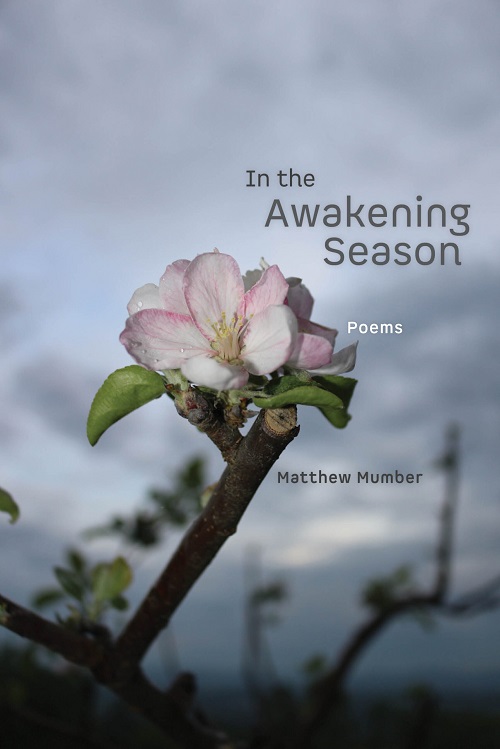
“If medicine were my spouse,” Matthew Mumber posits, “I would ask politely / if we could have a long-overdue chat.” It’s possible to understand many of these poems as a transcript of such conversation. Mumber, an oncologist, has given us a three-part book of thirty-eight poems in some sixty pages. The strengths of this collection include the poet’s investigating of his own spiritual path, as it intertwines, like the serpents on the rod of Asclepius, with his life and practice of medicine. Winding around and through his explorations is the cost of caring, both medically and emotionally. Mumber’s intellectual growth is ongoing; this is a doctor whose learning only expanded in the context of practice. Dealing with the most difficult of illnesses, his compassion is on display, yes, and also his humility. We can’t help but recall another physician-writer, Anton Chekhov, who famously wrote “Medicine is my lawful wife, and literature is my mistress. I go from one to another on different nights, and neither suffers from my infidelity.” In the poem quoted above, the narrator frets about “grief unprocessed,” and “the guilt of not being able to fix it all / for everyone / and still getting paid …” It is a species of candor rarely uncovered, and, in this case, blended into art.
Mumber often excels when, after building an image, he tenders a qualifying addition. Look at the center stanza of “Limitless Participation”:
After last night’s thunderstorm,
only the highest, wispy tree branches
Sway—
just a little.
It is the phrase “just a little” that both animates the image and drops it into focus. Similarly, in the middle of “On Being a Parent,” we get “I wish I could snap my fingers, / make it all fair.”
There are times when a given poem shows the poet a little too much, in small things like the scansion. For instance, in the eidetics of “Fine Tuning,” the narrator takes us through several relatable scenes in which he can “… sense / freedom / in the tiniest of things.” The final lines of the poem are: “I hardly ever notice / what is always / already present.” The poem would end more effectively on an accented syllable with the word “here,” instead of the trochee “present.” The poem has worked to posit the value of the “tiniest” things. The unaccented closing feels like the space between solid bars, when the poem could use an open window instead. Call me picky, I think it matters.
“Destiny,” which closes the first of three sections in the book, is a careful exposure of the poet’s commissioning, wherein we are placed in the position of accepting a role alongside the narrator. “Breathe with me,” it begins, “this ordinary day …” We cannot forget that in Mumber’s profession, he is trying to win, for his patients, further ordinary days. We cannot take lightly the poem’s admonition to “Take one step / then another …” as, “who knows if we will ever / find our way back.” If this sounds a tad dramatic, let me assure you, in context, it is soft-pedaled, even softly peddled, since, “Even those missteps / that twist our limbs, / roots of forgiveness.” And the closing? Sorry, no spoilers. Mumber investigates agency and responsibility without shirking their implications. Living and working, as he does, in the liminal rooms of human lives, we observe his sensitivity and dedication. No matter what, he will try.
Among the subtlest of poems is one which projects human envy onto the plant world, in a series of questions. In “Jealousy,” the narrator asks if the daffodil covets the oak tree’s slumber; and whether even given flowers want another flower’s spot in the earth. And finally, if, fearing comparison, “that [the flower] will be found // somehow lacking / through some fault of its own?” At bottom, Mumber is strongest when entertaining questions. His poet’s mind is a meandering seeker, recognizing those places where “not knowing exactly how,” [from a different poem] obviates neither curiosity nor duty.
In “Kenosis” we see a poet in full flower, engaging, with a Whitmanian nod, the “flowing, flowing! […] of forever fullness.” The poem deserves an essay all its own; a tripartite examination of Heart, Mind, and Body, in the context of a seeking of divine grace. Mumber’s spiritual grounding is the subtle hum of the origin of his universe. I say this not to disqualify a given poem’s foundation, but to emphasize that Mumber’s art often inheres in the friction between the natural world and an ecstatic appreciation thereof. The word “soul” in the hands of most poets can make me cringe. This is not the case, however, in Mumber’s use, where the term “soul” is a marker on yearning, on connecting. Considering of a cancer patient in the patient’s “frantic search for a noisy cure,” “His soul stretches toward the sky / as he touches the buried pains, / the finest underground tendrils of another …”
The book’s final poem, “Radiant Medicine,” is being left for readers to discover and revel in by themselves. The penultimate poem, “This Precious Life,” addresses the impossibility of a life lived wholly apart, even in the context of the pandemic. It is the kind of poem that helps us, that suggests an entryway. Before getting there, consider that “… all paths lead / to these false lives discarded, / rain-soaked clothes / hanging against / a damp, shadowed stone wall.” The strength of such an image lies in the superimposing of the transient, human figure against the liminal figure of the stone wall. It is stone, yes, but it’s also a division that can only be constructed by apprehending it, by an eye that gathers it in.
We feel the physician’s deepest dilemmas in the context of a COVID poem, “Front Line.” The narrator conflates dream with prayer, that “they will not have to be the one / who decides / who lives, / who dies.” For anyone who has ever wondered about this kind of ultimate responsibility for the lives and well-being of others, this book is an illuminated text of the emotions.
In the Awakening Season, by Matthew Mumber. North Adams, Massachusetts: Tupelo Press / Leapfolio, September 2020. 72 pages. $17.95, paper.
David Epstein holds a PhD in English and American Literature. Currently teaching Creative Writing at the University of Hartford, he can often be found in Woods Hole, Massachusetts. Epstein is on the board of the Greater Hartford Friends and Enemies of Wallace Stevens. He has three children, and lives in West Hartford, Connecticut. He has reviewed for Harvard Review and Shofar; his poems have appeared in such venues as Bellingham Review, Marsh Hawk Review, RatsAss Review, and more.
Check out HFR’s book catalog, publicity list, submission manager, and buy merch from our Spring store. Follow us on Instagram and YouTube. Disclosure: HFR is an affiliate of Bookshop.org and we will earn a commission if you click through and make a purchase. Sales from Bookshop.org help support independent bookstores and small presses.


Leave a comment